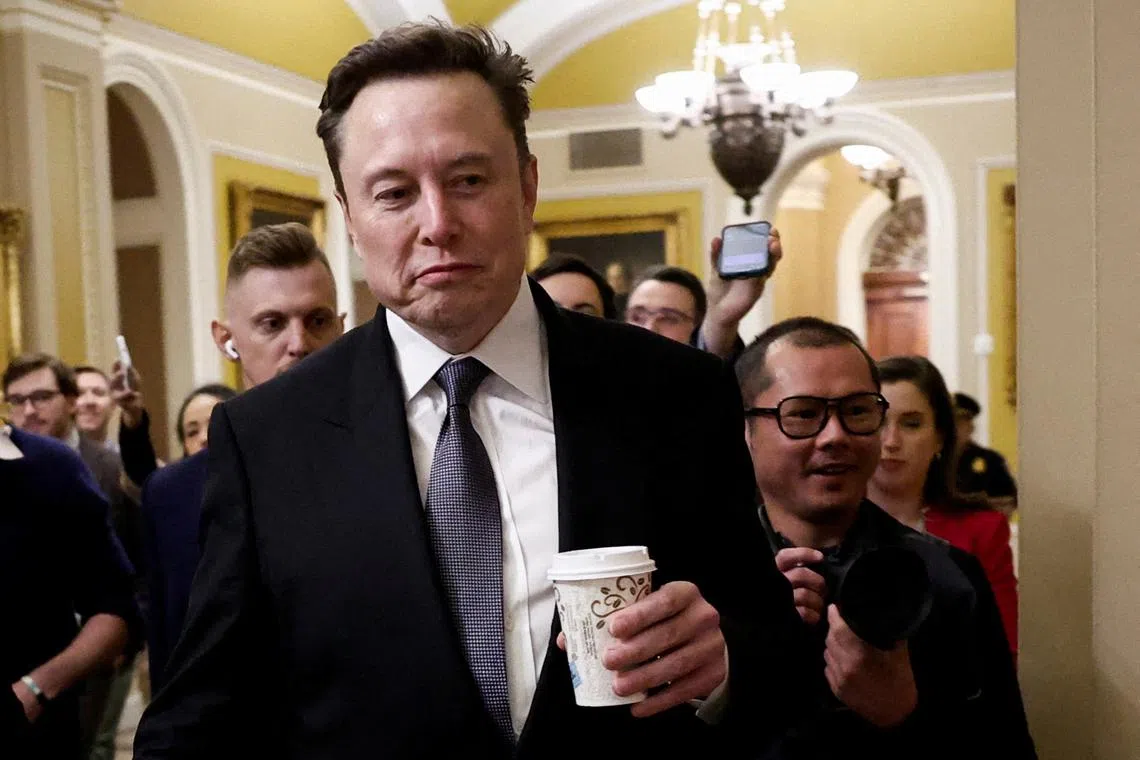Elon Musk brings Trump’s government efficiency push to Capitol Hill
Sign up now: Get ST's newsletters delivered to your inbox

Mr Elon Musk offered few details on how he will try to accomplish his sweeping cost-cutting goals.
PHOTO: REUTERS
WASHINGTON - Billionaire Elon Musk and former presidential candidate Vivek Ramaswamy met on Dec 5 with Republican lawmakers whose support they will need to win the sweeping spending cuts that President-elect Donald Trump has asked them to find.
Trump has named two entrepreneurs to a task force that aims for a sweeping overhaul of the US government, which spent US$6.8 trillion (S$9.1 trillion) in the most recent fiscal year. Mr Musk has set a target of US$2 trillion in savings, though he has not said whether that would come in a single year or over a longer period.
The two chairs of the Department of Government Efficiency have called for firing thousands of federal workers, slashing regulations and eliminating programs whose authorisation has expired, such as veterans’ healthcare.
That could be easier said than done. Any changes to veterans’ benefits or other popular programs that serve millions of Americans would likely encounter fierce blowback, and efforts to thin the workforce could disrupt everything from law enforcement to air traffic control.
“We want to help him in any way that we can. He’s got, obviously, a big mission. But we all think the effort they’re undertaking is long overdue,” Senator John Thune, who will lead the Republican majority in 2025, told reporters after meeting with Mr Musk.
Mr Musk, who earlier rushed through the Capitol’s crowded corridors clutching the hand of a small child, offered few details on how he will try to accomplish his sweeping cost-cutting goals.
“I think we just need to make sure we spend the public’s money well,” said Mr Musk.
The billionaire chief executive of electric car maker Tesla and SpaceX addressed only one specific policy, when asked about electric vehicle tax credits, responding: “I think we should get rid of all credits.”
Mr Musk’s companies benefit from federal contracts and tax breaks and also are subject to regulatory oversight, raising concerns that his involvement with the efficiency panel creates a conflict of interest.
Mr Ramaswamy met separately with a group of Senate Republicans including Mr Thom Tillis, who said afterward they discussed actions the Trump administration could take on its own, rather than those that would require legislation.
“Is this an administrative action that doesn’t require congressional approval? Rock on. Do it now or do it after Jan 20,” he told reporters.
As co-chairs of the efficiency task force, Mr Musk and Mr Ramaswamy, a former biotech executive, would likely have to work with Congress to secure significant reductions.
Republican trifecta
Republicans will control both chambers of Congress and the White House in 2025, but they may struggle to win significant reductions.
While lawmakers sign off on roughly US$1.7 trillion in defence and domestic programs each year, most federal spending consists of health, pension and other benefit programs that lie outside of the annual budget process. Lawmakers also have no control over interest payments, which are projected to top US$1 trillion in this fiscal year.
Republican lawmakers have said they are eager to cooperate.
Representative Marjorie Taylor Greene, a hard-right firebrand, will chair a House of Representatives panel to work with Mr Musk and Mr Ramaswamy, and Senate lawmakers have also expressed openness to the idea.
Republicans secured limited spending cuts in a 2023 showdown with Democratic President Joe Biden but have been unable to agree on further reductions since then.
Trump has broken with former Republican orthodoxy by saying he will not cut benefits for the Social Security pension plan or the Medicare health plan for seniors, which together account for more than one-third of federal spending.
Trump showed little interest in spending cuts during his first 2017 to 2021 term in office, when federal expenditures grew from US$4 trillion to US$6.2 trillion. Congress did not act on his proposal to eliminate more than a dozen small government agencies and failed to repeal Democratic President Barack Obama’s signature Affordable Care Act, a central goal of the party. REUTERS


